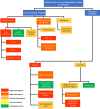Prevention of re-establishment of malaria: historical perspective and future prospects
- PMID: 33287809
- PMCID: PMC7720033
- DOI: 10.1186/s12936-020-03527-8
Prevention of re-establishment of malaria: historical perspective and future prospects
Abstract
Prevention of re-establishment (POR) refers to the prevention of malaria outbreak/epidemic occurrence or preventing re-establishment of indigenous malaria in a malaria-free country. Understanding the effectiveness of the various strategies used for POR is, therefore, of vital importance to countries certified as "malaria-free" or to the countries to be thus certified in the near future. This review is based on extensive review of literature on both the POR strategies and elimination schemes of countries, (i) that have reached malaria-free status (e.g. Armenia, Mauritius, Sri Lanka), (ii) those that are reaching pre-elimination stage (e.g. South Korea), and (iii) countries at the control phase (e.g. India). History has clearly shown that poorly implemented POR programmes can result in deadly consequences (e.g. Sri Lanka); conversely, there are examples of robust POR programmes that have sustained malaria free status that can serve as examples to countries working toward elimination. Countries awaiting malaria elimination status should pre-plan their POR strategies. Malaria-free countries face the risk of resurgence mostly due to imported malaria cases; thus, a robust passenger screening programme and cross border collaborations are crucial in a POR setting. In addition, sustained vigilance, and continued funding for the national anti-malarial campaign programme and for related research is of vital importance for POR. With distinct intrinsic potential for malaria in each country, tailor-made POR programmes are built through continuous and robust epidemiological and entomological surveillance, particularly in countries such as Sri Lanka with increased receptivity and vulnerability for malaria transmission. In summary, across all five countries under scrutiny, common strengths of the POR programmes are (i) a multipronged approach, (ii) strong passive, active, and activated passive case detection, (iii) Indoor residual spraying (IRS), and (iv) health education/awareness programmes.
Keywords: Importation risk; Malaria elimination; Plasmodium falciparum; Plasmodium vivax; Prevention of re-establishment; Receptivity; Surveillance; Vulnerability.
Conflict of interest statement
The authors declare that they have no competing interests.
Figures
References
-
- WHO. World malaria report 2019. Geneva: World Health Organization; 2019. https://apps.who.int/iris/handle/10665/330011. Accessed 1 Mar 2020.
-
- Malaria. https://www.who.int/news-room/fact-sheets/detail/malaria. Accessed 1 Mar 2020.
-
- World Health Organization Global Malaria Programme University of California San Francisco . Eliminating malaria-preventing reintroduction in Mauritius. Geneva: World Health Organization; 2012.
-
- Unit CDC. Surveillance of passengers at office level: malaria. Ministry of Health and Quality of Life: Republic of Mauritius; 2009.
Publication types
MeSH terms
Grants and funding
LinkOut - more resources
Full Text Sources
Medical


